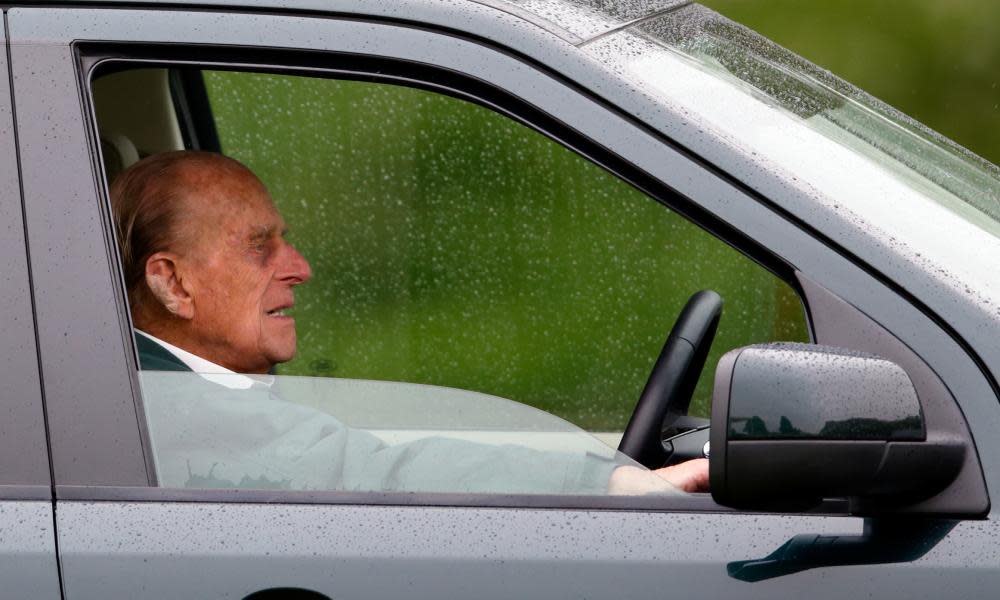Prince Philip and telling your dad to give up driving

Your leader comment on road safety (The moral of the duke’s story, 19 January) that reactions get slower as we age may not be correct.
At one time in my career I was responsible for safety and training in a very large road haulage fleet. At regular sessions with seasoned HGV drivers, we included a go on a reaction test machine. We systematically recorded the time taken to apply a “footbrake” on a red signal light. There was no difference whatsoever between drivers of all ages between 25 and 65. The older bodies got the brake on just as quick as the younger ones.
From other data we collected about collisions we deduced that some older drivers were perhaps a little more preoccupied with the rich vein of life involvements in their head, with consequent lapses in maintaining all-round observation, the key to rapid reaction times.
Terry Sheppard
Rothley, Leicestershire
• You write that “the evidence does not support the idea that older drivers are more dangerous than other drivers”. This must surely be because family members (usually the children) of older drivers frequently take on the difficult task of persuading them to give up driving. This is always a huge step as it leads to a reduction in autonomy and pleasurable activities, and for many people up and down the country there are no adequate alternative transport arrangements. It is also made more difficult by the absence of clear criteria and re-testing procedures. However, failure to act leads to an unacceptable risk to the older driver and other road users. I suspect that Charles, Anne, Andrew and Edward will have their work cut out, but they are not alone in having to deal with a stubborn parent.
Peter Bardsley
Sheffield
• The reports of Prince Philip’s crash have raised the issue of whether older drivers should be required to take an annual eye test. That would not be enough, as I discovered when I had to persuade my 90-year-old father to stop driving. Having had two successful cataract operations he would have passed any eye test, but his nearly new car had already acquired dents and scratches. Much more important were his slow reactions. This was exemplified by a glass falling out of a kitchen cupboard and smashing to pieces on the floor, which he didn’t even notice. We couldn’t risk him running into someone else, least of all a small child. Now fast approaching 70, my own reactions aren’t what they were and hope I shall voluntarily stop driving in time.
Alan Weeks
Wincle, Cheshire
• Although individual cases must not be used to set policy, the Duke of Edinburgh’s accident has raised the issue of safety when older people continue to drive much more than other recent incidents. With aging comes deterioration in vision, concentration, coordination, memory, dexterity and other functions essential to safe driving but they start at varying ages and progress at different rates. A cut-off at any specific age will disadvantage many people unnecessarily.
The present system of renewal from 70 is not working. There need to be clearer guidelines and, in many situations, objective tests. For example many countries require eyesight testing for licence renewal.
There is also pressure on doctors to sign these forms because a car is often essential to avoid becoming housebound. The system needs the ability for independent assessment, though not necessarily at 70. There also needs to be a restoration and improvement in public transport so that older people who are unsafe, or choose not to drive, can continue to shop, visit friends, and participate in community activities.
Michael Peel
Axbridge, Somerset
• Have photographs of Prince Philip driving Land Rovers now superseded pictures of Theresa May going to church (Letters, passim)?
Toby Wood
Peterborough, Cambridgeshire
• Join the debate – email guardian.letters@theguardian.com
• Read more Guardian letters – click here to visit gu.com/letters
• Do you have a photo you’d like to share with Guardian readers? Click here to upload it and we’ll publish the best submissions in the letters spread of our print edition

 Yahoo News
Yahoo News 
